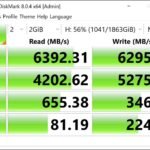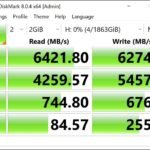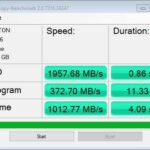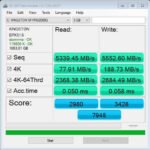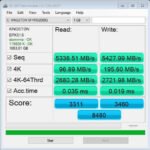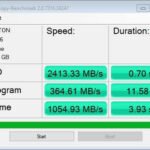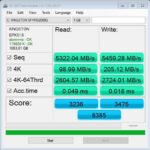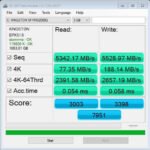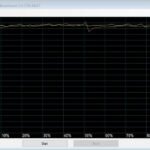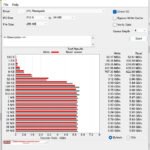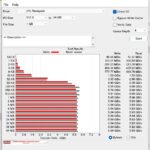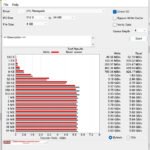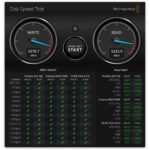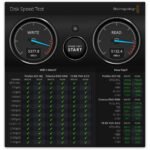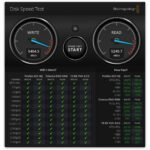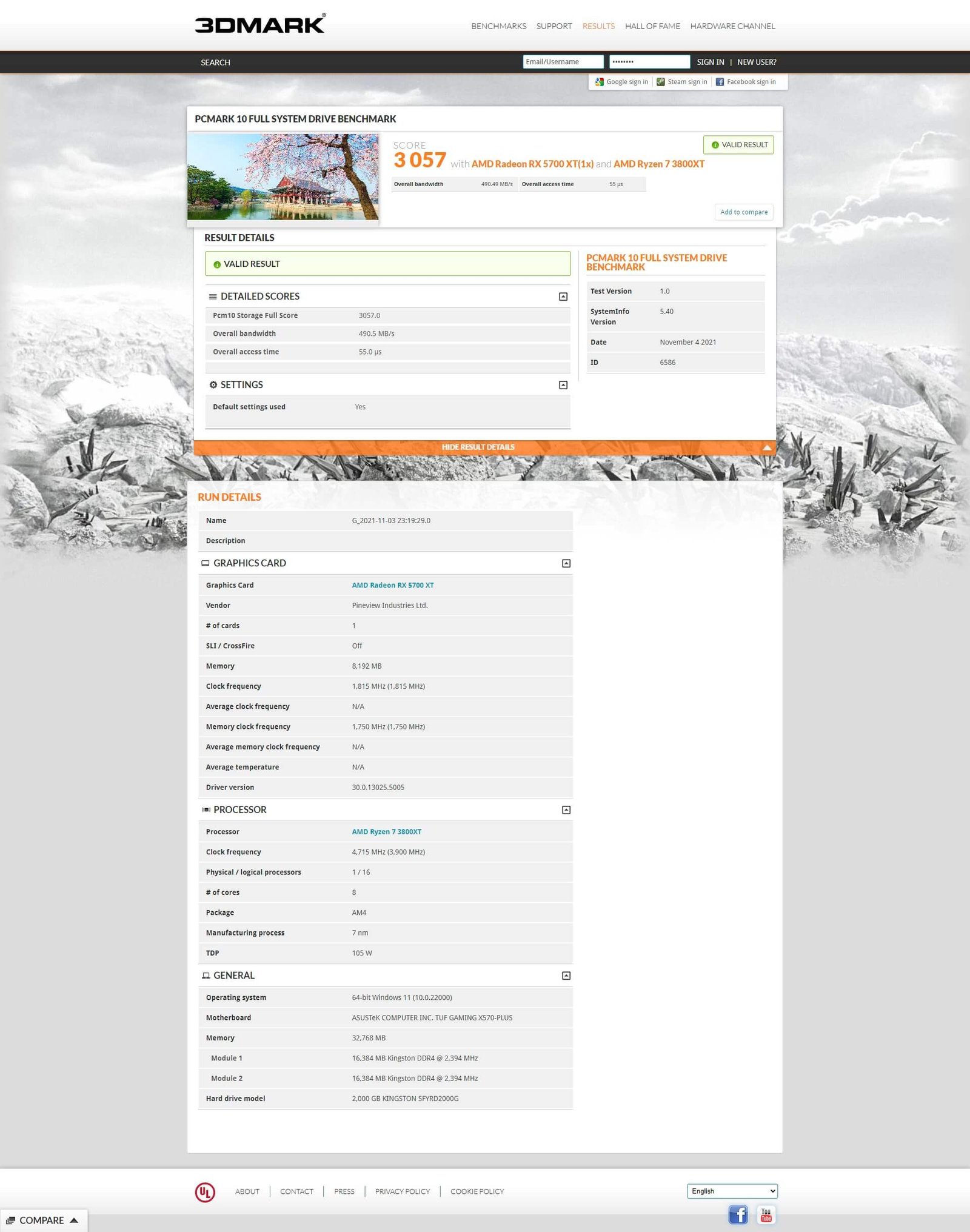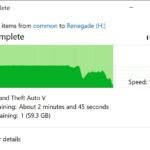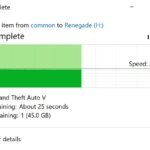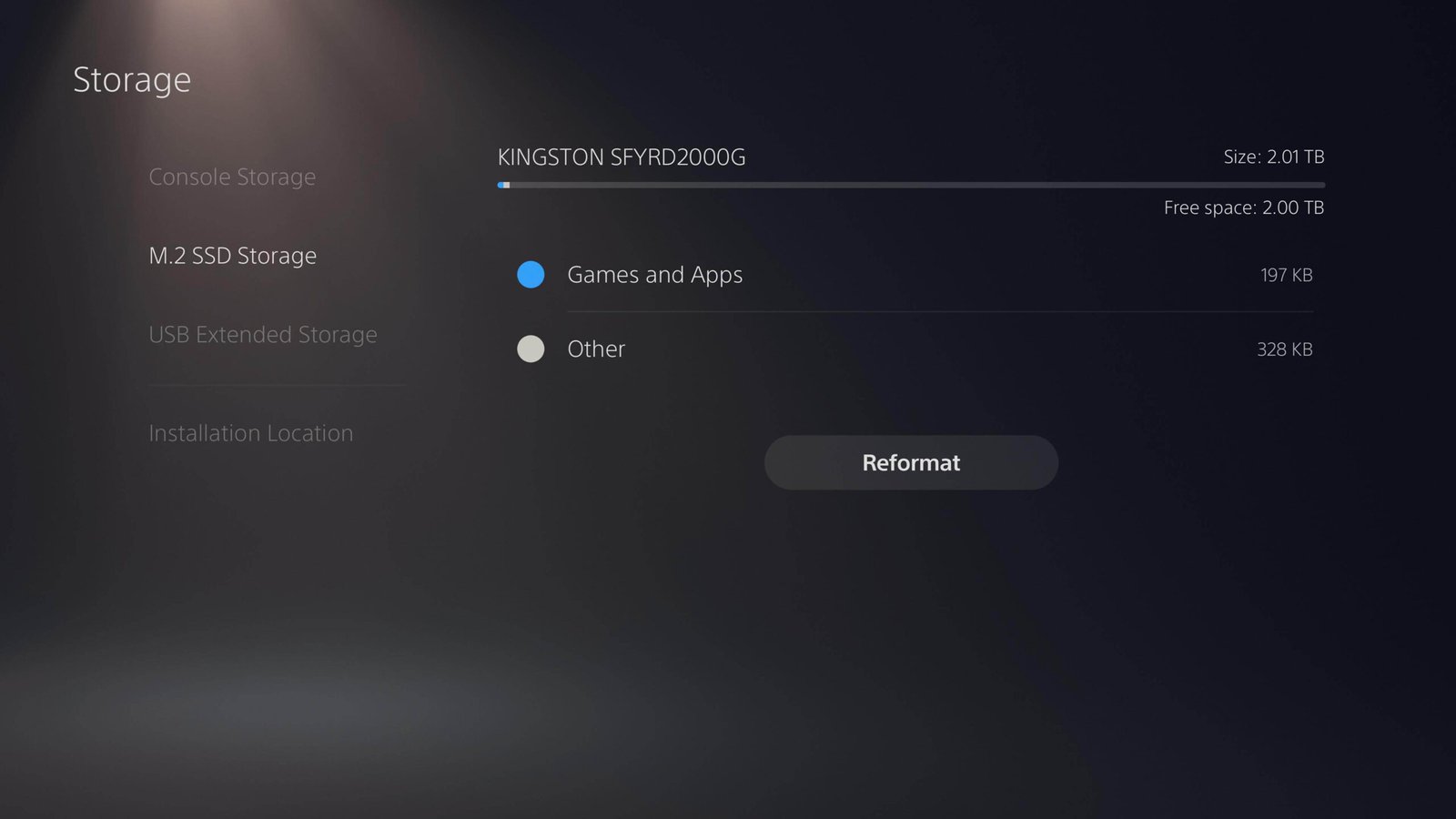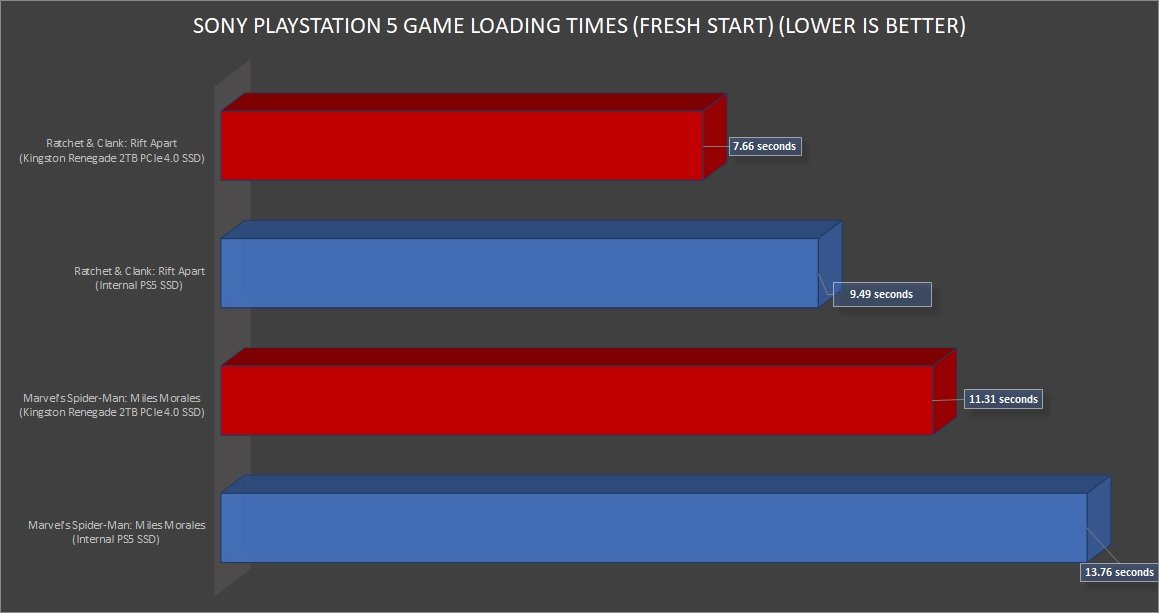Since the introduction of the next-generation PC platforms and game consoles, memory makers have released PCIe 4.0 SSDs for gamers and enthusiasts and claim the crown of the fastest storage drives on the planet. While Kingston may not be among the first to release PCIe 4.0 SSDs, they recently did announce two impressive products- the Kingston KC3000 and the Kingston Renegade PCIe Gen 4 SSDs. We got a chance to try out the Kingston 2TB FURY Renegade PCIe 4.0 SSD and here are our thoughts about the drive.
Features and Specifications

Back in CES 2021, Kingston had teased that they were developing a PCIe 4.0 SSD with the codename as the “Ghost-Tree”. And while the company may be a bit late to enter the race for the fastest storage drive, the newly launched KC3000 and the Renegade SSD would surely grab the attention of many gamers and enthusiasts.
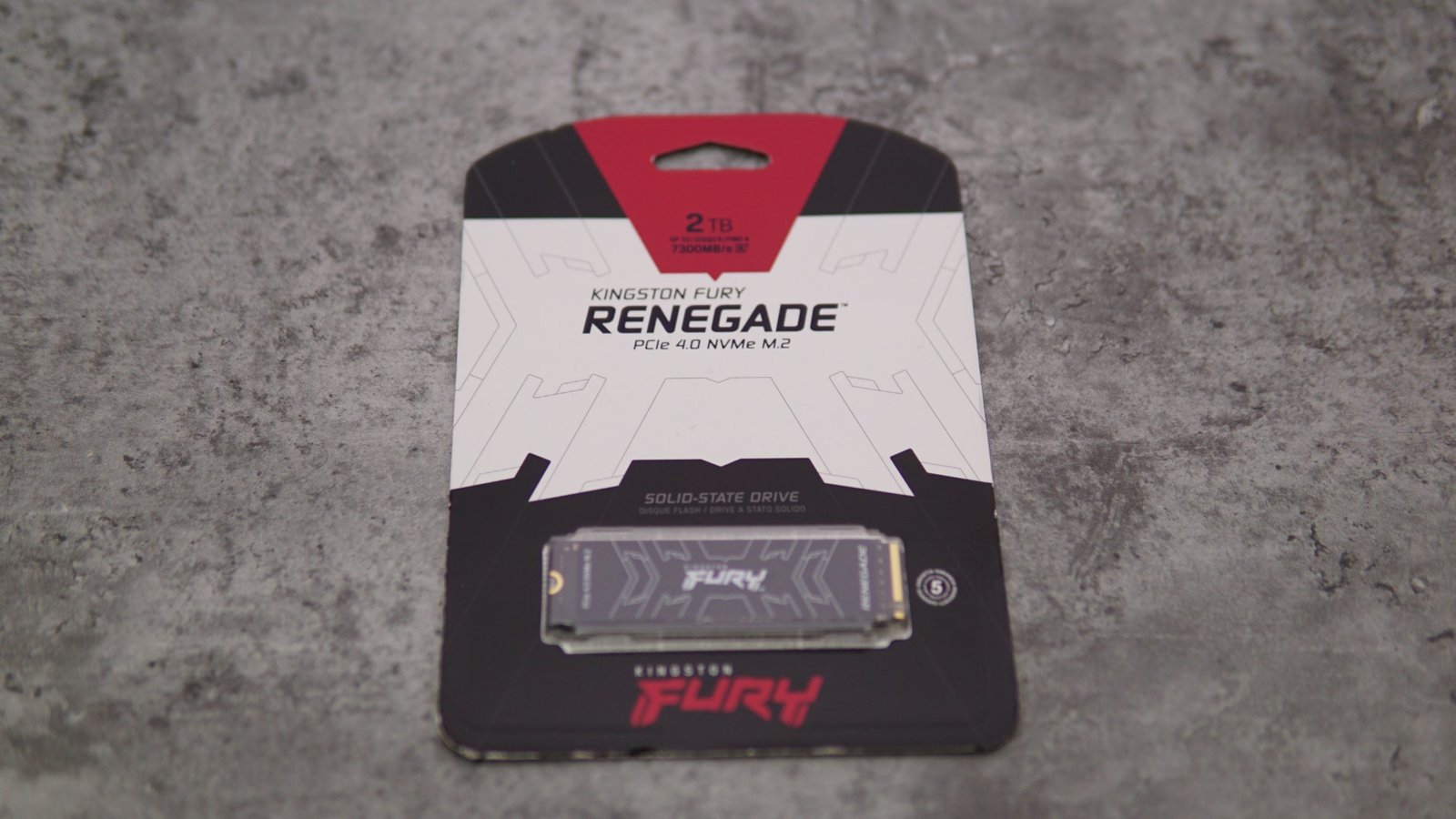 With HyperX out of the equation, Kingston now focuses on gaming memory products under the FURY series line-up. We had recently reviewed the Kingston FURY Renegade 3600MHz DDR4 RAM which offered top-of-the-line performance figures. And now the FURY Renegade PCIe 4.0 SSD is here to take on the likes of other top SSD brands. As you can see, the FURY Renegade features a low-profile graphene aluminium heat spreader with a black-themed design that resembles the one on the FURY Renegade 3600MHz DDR4 RAM.
With HyperX out of the equation, Kingston now focuses on gaming memory products under the FURY series line-up. We had recently reviewed the Kingston FURY Renegade 3600MHz DDR4 RAM which offered top-of-the-line performance figures. And now the FURY Renegade PCIe 4.0 SSD is here to take on the likes of other top SSD brands. As you can see, the FURY Renegade features a low-profile graphene aluminium heat spreader with a black-themed design that resembles the one on the FURY Renegade 3600MHz DDR4 RAM.
 Kingston mentions that the graphene aluminium heat spreader is designed to offer advanced thermal dissipation under tight spaces on gaming laptops and motherboards, ensuring that the drive performs at its highest capability during intense sessions. The question of whether you will need a dedicated heatsink or not depends upon the user. However, during our tests, we saw the temperatures race to almost 72 degrees and the drive did not throttle its performance. It should be noted that the drive has memory chips on both the top and bottom sides of the drive.
Kingston mentions that the graphene aluminium heat spreader is designed to offer advanced thermal dissipation under tight spaces on gaming laptops and motherboards, ensuring that the drive performs at its highest capability during intense sessions. The question of whether you will need a dedicated heatsink or not depends upon the user. However, during our tests, we saw the temperatures race to almost 72 degrees and the drive did not throttle its performance. It should be noted that the drive has memory chips on both the top and bottom sides of the drive.
 We tested the drive on an open testbed where there is some airflow. Our testbed features the ASUS TUF GAMING X570-PLUS mid-range motherboard, the Zen2 based AMD Ryzen 3800XT processor, an XFX Radeon 5700 XT THICC II GPU, a pair of Kingston FURY Renegade 3600MHz DDR4 RAM, another Kingston KC2500 SSD, the Corsair iCUE H100i RGB PRO XT AIO for the CPU and the XFX XTI 1000W PSU.
We tested the drive on an open testbed where there is some airflow. Our testbed features the ASUS TUF GAMING X570-PLUS mid-range motherboard, the Zen2 based AMD Ryzen 3800XT processor, an XFX Radeon 5700 XT THICC II GPU, a pair of Kingston FURY Renegade 3600MHz DDR4 RAM, another Kingston KC2500 SSD, the Corsair iCUE H100i RGB PRO XT AIO for the CPU and the XFX XTI 1000W PSU.
During our tests, the Kingston FURY Renegade operated at 48 degrees when idle. However, upon using the heatsinks that come with the motherboard, the idle drive temperatures were lower at 44 degrees. We had then simulated a bit for airflow with a cooling fan, and when idle and without a heatsink, the drive operated at 42 degrees. We repeated the same situation using the heatsink and the Renegade SSD ran much cooler at 36 degrees.
While the drive always hits around the 70-degree mark at peak operations, using a heatsink cuts down the temperatures to 60 degrees. The Kingston Renegade PCIe 4.0 SSD isn’t just about a stylish heat spreader, it has an amazing performance to take on the best drives such as the WD SN850, the Samsung 980 Pro, and the Seagate FireCuda 530. The heart of the Renegade drive is the Phison E18 memory controller and the drive uses 3D TLC memory. The device also features 2GB of DRAM.
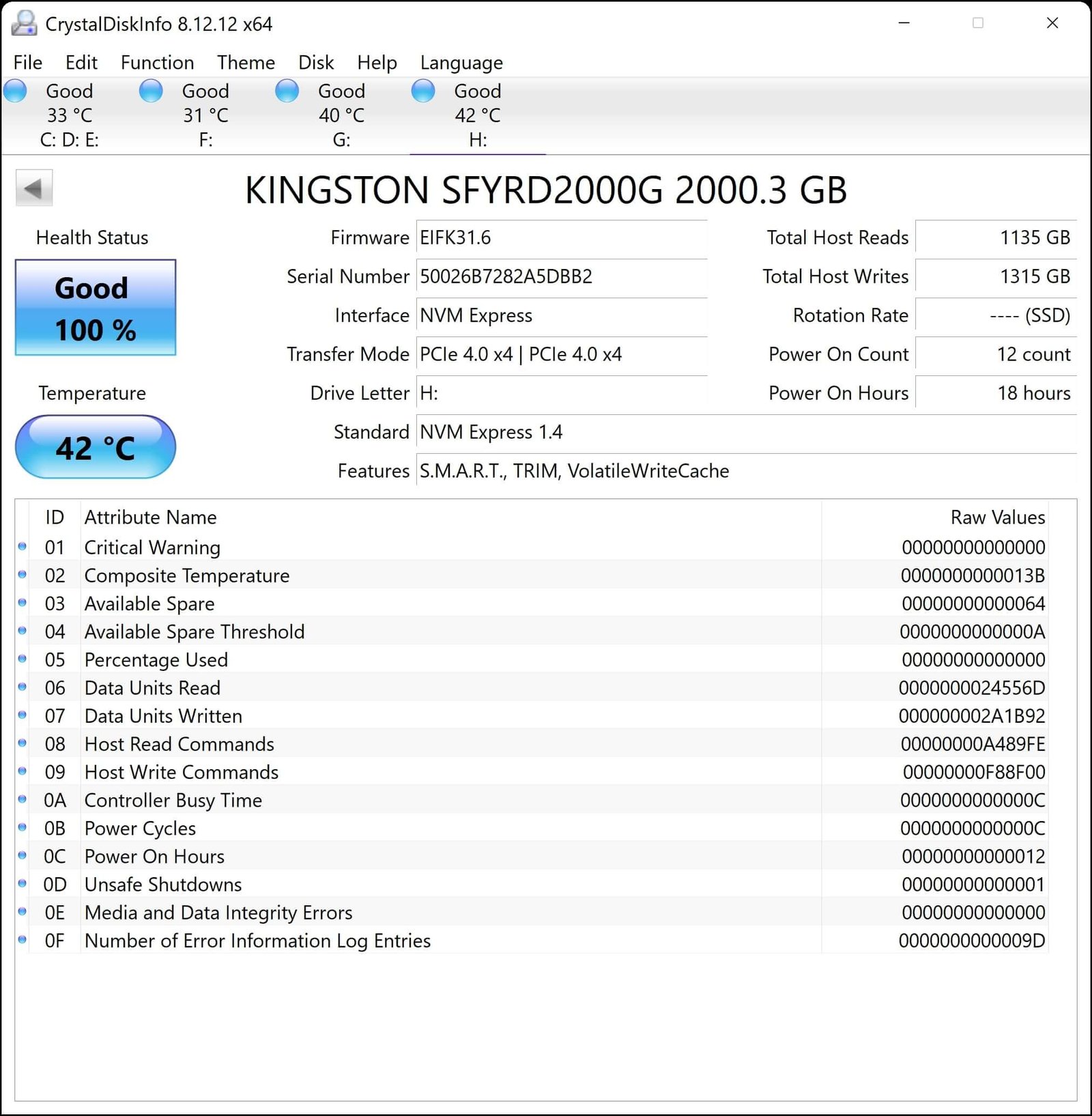 While the FURY Renegade SSD comes in 500GB, 1TB, 2TB, and 4TB storage options, the performance isn’t the same for all. The 500GB storage model features a sequential read/write speed of 7,300/3,900MB/s and the 1TB model has a faster performance figure of 7,300/6,000MB/s. However, the 2TB and 4TB models take it higher to 7300MB/s read and 7000MB/s write speeds. The model we got for review is the 2TB FURY Renegade SSD.
While the FURY Renegade SSD comes in 500GB, 1TB, 2TB, and 4TB storage options, the performance isn’t the same for all. The 500GB storage model features a sequential read/write speed of 7,300/3,900MB/s and the 1TB model has a faster performance figure of 7,300/6,000MB/s. However, the 2TB and 4TB models take it higher to 7300MB/s read and 7000MB/s write speeds. The model we got for review is the 2TB FURY Renegade SSD.
And when it comes to random 4K read/write performance figures, the 500GB model features a performance of 450,000/900,000 IOPS, the 1TB model at 900,000/1,000,000 IOPS, and the 2TB/4TB model at 1,000,000/1,000,000 IOPS. We were also impressed with the fact that the Renegade SSDs have a high rate of TBW capability. The 1TB model features 1.0 PBW, the 2TB for 2.0 PBW, and the 4TB model with 4.0 PBW. That’s a lot of data that can be written. However, the 500GB model only features 500GB of TBW.
We tested the drive using popular benchmark tools such as CrystakDiskMark, AS SSD, ATTO, DiskBench, DiskSpeed, PC Mark 10 System Drive test, FINAL FANTASY XIV: Shadowbringer loading speed test, and some real-time file transfer tests. It should be noted that we did test the drive for some of the benchmarks using Windows 10 Pro and Windows 11 Pro.
Benchmarks
CrystalDiskMark
We tested the drive using CrystakDiskMark on both fresh installs of the latest Windows 10 Pro and Windows 11 Pro builds and achieved a maximum read speed of 6421MB/s and write speeds up to 6295MB/s. Our scores are about over 600MB/s shy of the 7000+ MB/s read and write speeds that Kingston specified. And we suspect it’s mostly because of the bottlenecking from the mid-range X570 motherboard and we are sure the drive will run much better with a faster hardware setup. That said, not everyone would have the highest-end PC setup and this is a good indication of how the drive performs on older hardware.
- CrystalDiskMark test of Kingston FURY Renegade SSD on Windows 10 Pro (2GiB)
- CrystalDiskMark test of Kingston FURY Renegade SSD on Windows 11 Pro (2GiB)
- CrystalDiskMark test of Kingston FURY Renegade SSD on Windows 11 Pro (4GiB)
AS SSD benchmark
ATTO
- ATTO test of Kingston FURY Renegade SSD (256MB)
- ATTO test of Kingston FURY Renegade SSD (1TB)
- ATTO test of Kingston FURY Renegade SSD (4TB)
DiskSpeed test
The DiskSpeed test is a good tool to measure the performance of the drive for all those video editors using the Black Magic software. Our benchmark on Windows 10 Pro achieved a read and write speed of 5379MB/s and 5224MB/s, respectively. We got a slightly faster performance on the Windows 11 Pro, reaching read and write speeds of 5464MB/s and 5249MB/s, respectively.
- DiskSpeed test of Kingston FURY Renegade SSD on Windows 10 Pro
- DiskSpeed test of Kingston FURY Renegade SSD on Windows 10 Pro (5GB)
- DiskSpeed test of Kingston FURY Renegade SSD on Windows 11 Pro
DiskBench
We also ran the DiskBench application to copy a GTA 5 game folder to the Renegade drive and the folder is nearly 100GB in size.
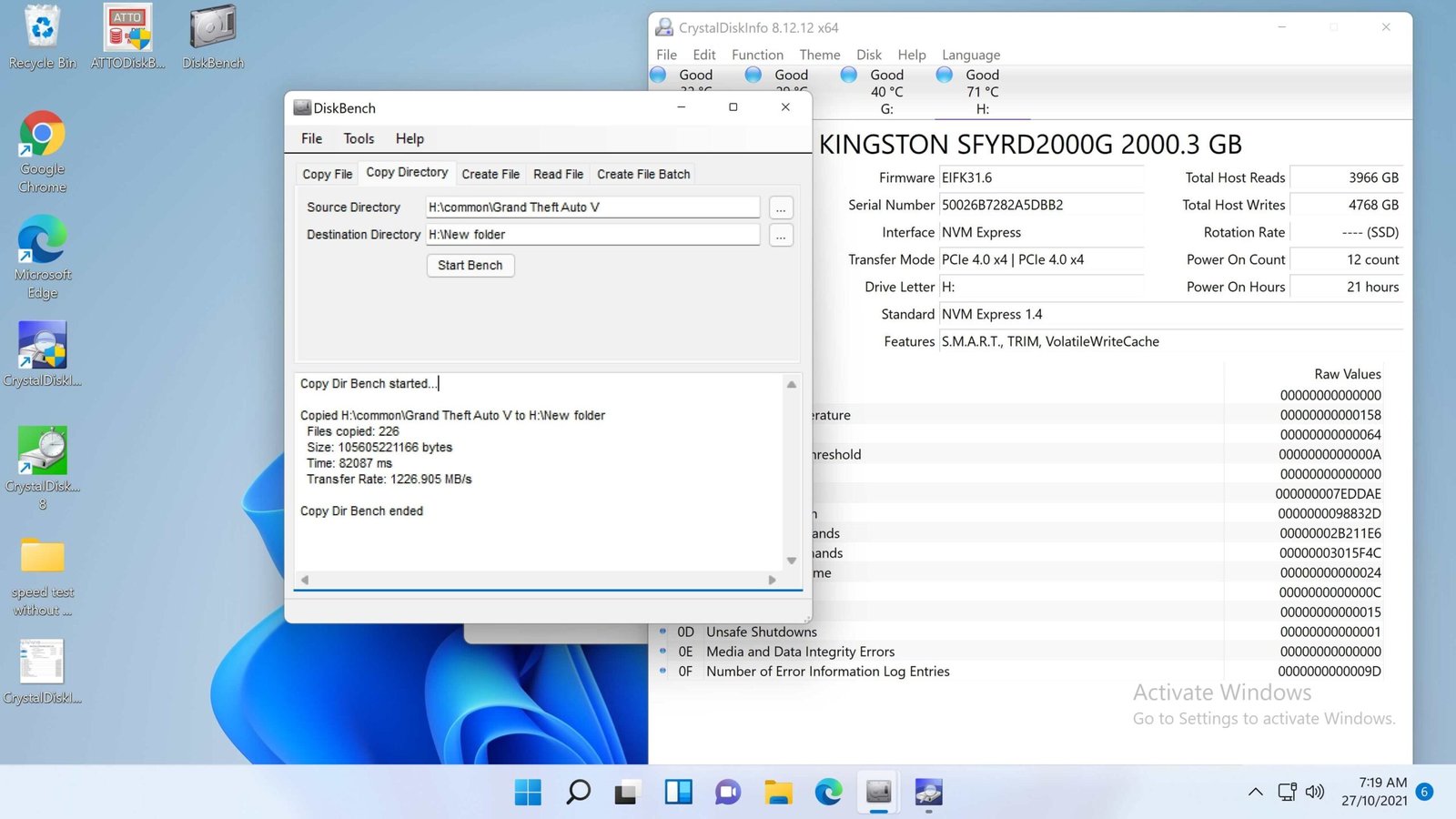
DiskBench test of Kingston FURY Renegade SSD on Windows 11 Pro (copying GTA 5 folder approx. 100GB)
PC Mark 10 Full System Drive test
FINAL FANTASY XIV: Shadowbringers benchmark (High Desktop preset)

Total loading time: 10.940 seconds, DX11 score: 8412
File Transfer tests
Our final PC test of the Renegade is the real-time copy speeds. We used a zipped file of the entire GTA 5 folder that is around 100GB in size and we were copy-pasting within the same drive. Unfortunately, we did not have a second PCIe 4.0 SSD to check the actual copy speed performance between two different Gen 4 drives. We conducted this test multiple times on both Windows 10 Pro and Windows 11 Pro OS and achieved similar results. During the tests, the file was copied at a maximum speed of 2.21GB/s. The entire 100GB zip file was copied over without any major drop in speeds, and this got us curious about how long the write cache can hold the data. We then tried copying two zipped files of the GTA 5 folder (100GB each). While the drive copied over the first zip file at high speeds and without filling the write cache, the performance started to drop when about 30GB of the second zip file was copied over already. This indicated that the write cache was filled after 135GB of data was copied to the Renegade. The copy speed drops so low well below 100MB/s, sometimes up to 16MB/s. We repeated this test many times and sometimes also found that the write cache fills up after 150GB of data is copied.
Kingston FURY Renegade PCIe 4.0 and Sony PlayStation 5
As it stands on the console market, there is no denying that the PlayStation 5 console owners have the freedom to choose between a variety of PCIe 4.0 SSDs. We took the initiative to try the Kingston FURY Renegade SSD on the PS5. However, we were surprised by the fact that Kingston did not introduce a heatsink with the SSD, as seen from WD, Sabrent, and Seagate. Even Samsung had recently announced a heatsink version of the 980 Pro. And unlike mounting the SSD on a PC with efficient cooling, the M.2 slot on the PS5 doesn’t exactly get a cool airflow.
Unfortunately, during the time of our review, we did not have a heatsink to test the SSD and its loading performance on the PS5. That said, the read speed is all that matters here and upon installing and booting up the console, the PS5 ran a read speed test and provided us with a score of 6557MB/s. It’s surprising that the read speeds were slightly higher than the scores of our testbed.
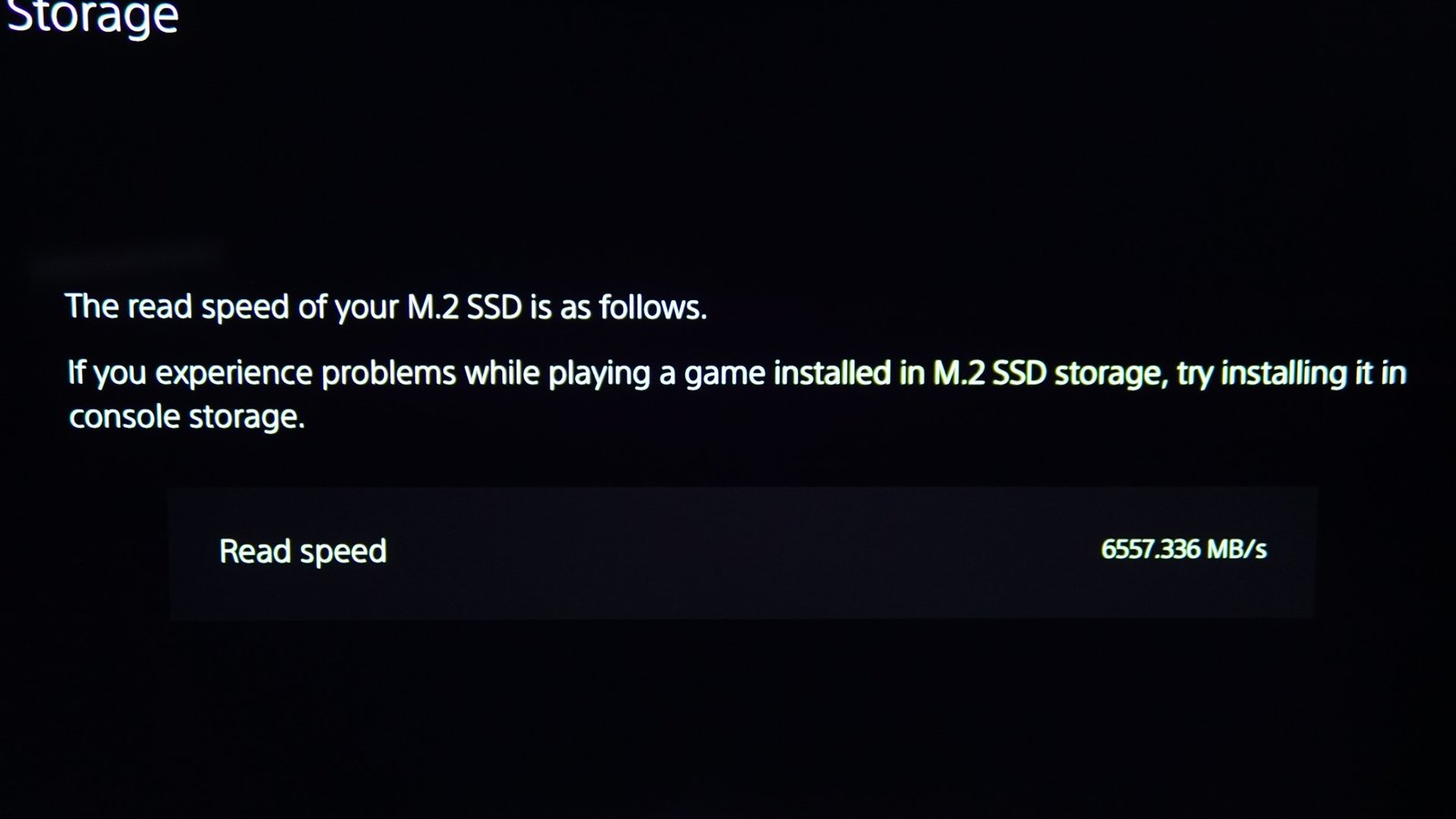 We had two exclusive PS5 games at the time of testing: Marvel’s Spider-Man: Miles Morales and Ratchet & Clank: Rift Apart. We first ran a test run of the games running from a freshly booted console and compared the loading times between the internal SSD and the Kingston FURY Renegade SSD. We then ran levels for both the games and compared the loading times between the internal drive and the Renegade SSD.
We had two exclusive PS5 games at the time of testing: Marvel’s Spider-Man: Miles Morales and Ratchet & Clank: Rift Apart. We first ran a test run of the games running from a freshly booted console and compared the loading times between the internal SSD and the Kingston FURY Renegade SSD. We then ran levels for both the games and compared the loading times between the internal drive and the Renegade SSD.
There is no doubt here that the Kingston FURY Renegade is faster than the PS5’s internal SSD. For the test run involving loading the game, Marvel’s Spider-Man: Miles Morales took about 9.49 seconds to run from the internal drive and 7.66 seconds on the Renegade SSD. Ratchet & Clank: Rift Apart took about only 11.31 seconds on the Kingston drive as compared to the 13.76 seconds of the PS5’s internal drive.
And when it comes to loading a level, the loading time differences are very minimal, with FURY Renegade PCIe 4.0 SSD taking the lead. We wonder if the loading times could be improved by using a heatsink. It should be noted that we will soon be getting the Sabrent SSD heatsink for the PS5 for review. The heatsink is designed to replace the M.2 metal lid and we will be revisiting these scores soon. That said, copying the Spider-Man: Miles Morales game from the internal SSD to the Renegade took only about 30 seconds. Copying Ratchet & Clank: Rift Apart from the internal drive to the Renegade took about 33 seconds. However, copying games back from the Renegade to the internal drive takes well over 2-3 minutes for each game, and this is something already noted by many. Perhaps Sony deliberately slowed the write speeds of the internal drive to keep the lifespan intact. We also tried copying both the games from the internal to the Kingston drive, and see if the drive throttles. Both the games were copied to the Renegade within 70 seconds.
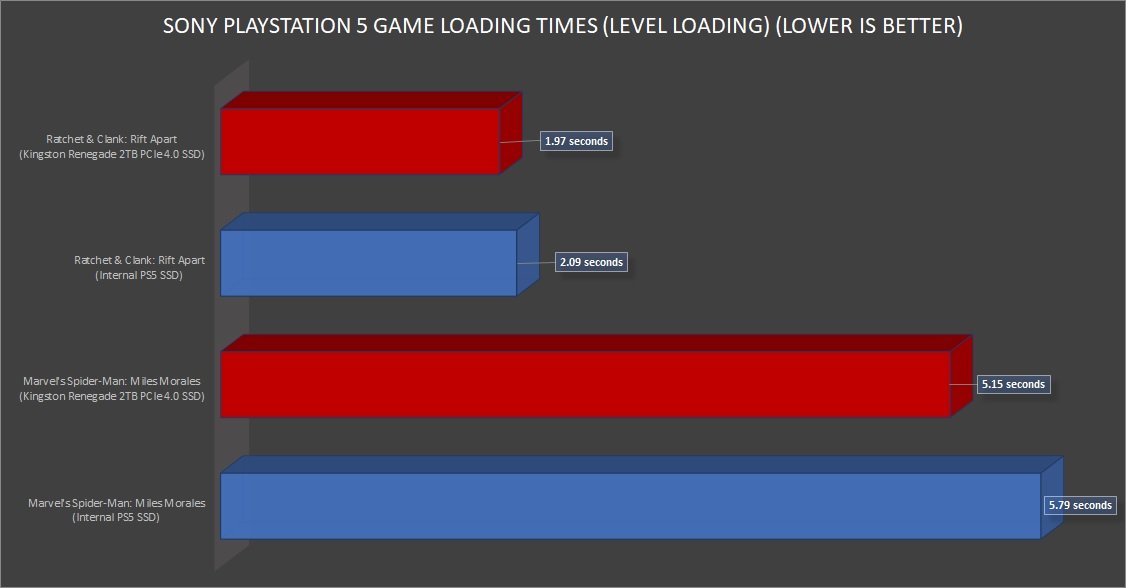 Verdict
Verdict
Kingston continues to prove that it can provide high-performing memory components, and the FURY series line-up now has both the Renegade DDR4 and the Renegade PCIe 4.0 SSDs for gamers and enthusiasts. The 2TB FURY Renegade easily goes toe-to-toe with the fastest Gen4 PCIe drives on the market, thanks to the 7300MB/s read speed and 7000MB/s write speeds. Even with a mid-range PC setup, the drive is still capable of achieving over 90% of its capability. The Renegade performs at its best even at high temperatures, thanks to its low-profile graphene aluminium heat spreader.
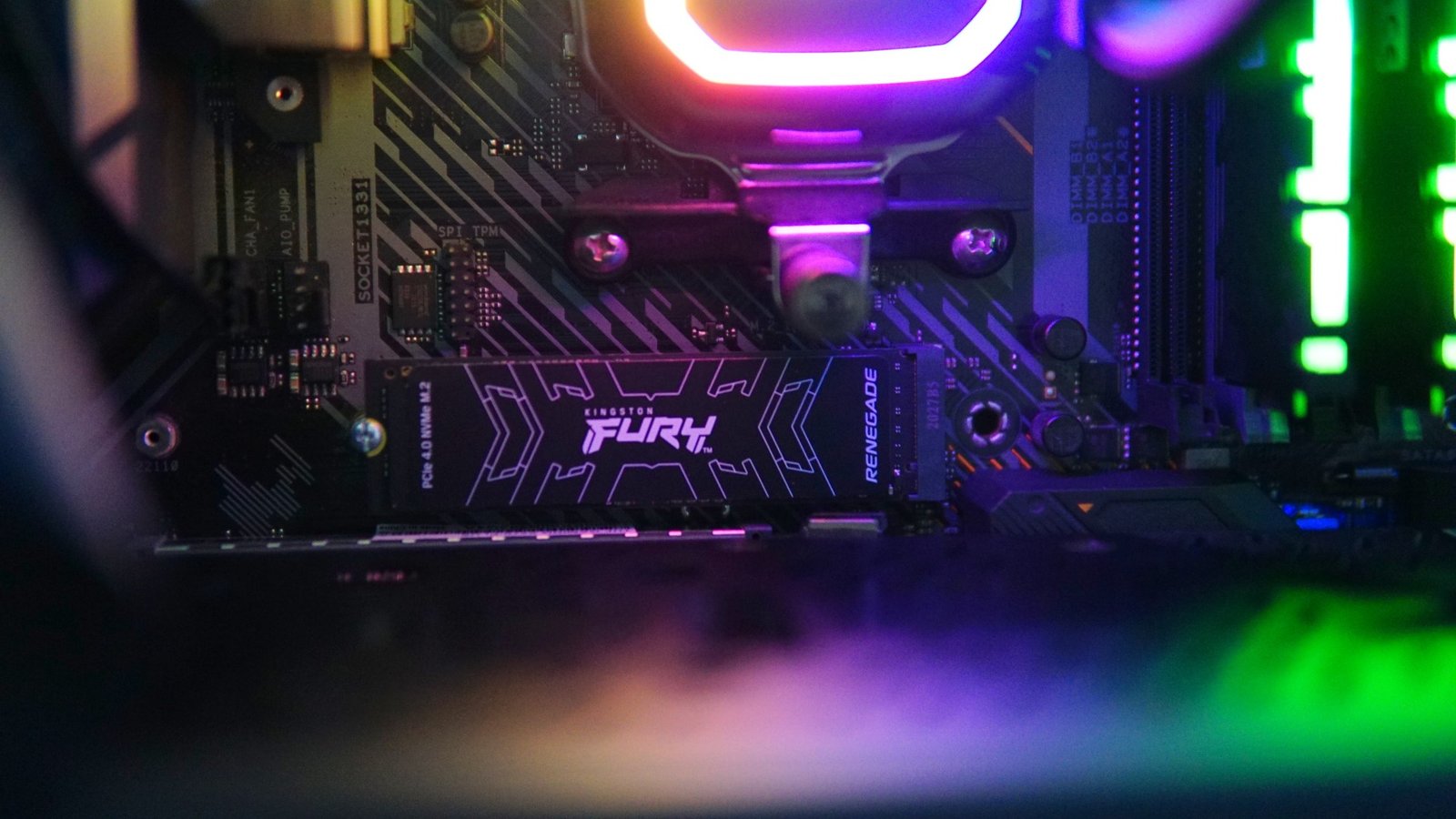 The drive also features an outstanding total bytes written figure of about 2.0 PBW, which ensures longevity for gamers and professional users. The Kingston FURY Renegade PCIe 4.0 SSD is also a good option for PS5 owners looking to expand their storage and the drive features a read speed of 6557MB/s. The Renegade loads PS5 games faster than the internal SSD of the PlayStation 5. Let’s just hope that Kingston considers releasing a heatsink version of the FURY Renegade PCIe 4.0 SSD in the future.
The drive also features an outstanding total bytes written figure of about 2.0 PBW, which ensures longevity for gamers and professional users. The Kingston FURY Renegade PCIe 4.0 SSD is also a good option for PS5 owners looking to expand their storage and the drive features a read speed of 6557MB/s. The Renegade loads PS5 games faster than the internal SSD of the PlayStation 5. Let’s just hope that Kingston considers releasing a heatsink version of the FURY Renegade PCIe 4.0 SSD in the future.



